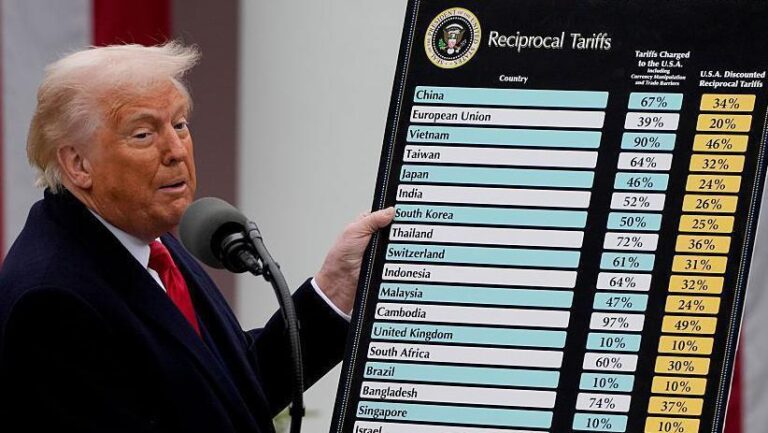In a pointed message to the United States, Brazilian President Luiz Inácio Lula da Silva recently conveyed to former President Donald Trump that Brazil possesses the economic resilience to withstand reductions in trade with the U.S. This statement comes amid ongoing tensions surrounding Trump-era tariffs, highlighting shifting dynamics in international trade relations. As Brazil asserts its capacity to diversify its trading partnerships, the move signals a potential recalibration of economic strategies in response to protectionist policies championed by the former American administration.
Trump’s Tariffs Pressure Brazil to Diversify Trade Partnerships
Recent trade tensions have pushed Brazil to rethink its economic alliances as tariffs imposed by the U.S. under the Trump administration continue to challenge the South American giant’s export landscape. In response, President Lula emphasized that Brazil is actively seeking to enhance its trade relationships beyond the United States, spotlighting negotiations with alternative partners across Asia and Europe. This strategic pivot includes expanding agricultural exports and industrial goods, aiming to reduce dependency on the American market without compromising growth.
Key sectors targeted for diversification include soybeans, beef, and manufactured goods. The government’s approach involves boosting bilateral trade agreements and leveraging global platforms such as Mercosur and BRICS. Below is a simplified overview of Brazil’s shifting trade focus in 2024:
| Trade Partner | Focus Area | Projected Export Growth |
|---|---|---|
| China | Agricultural Products | +12% |
| European Union | Manufactured Goods | +8% |
| India | Energy & Commodities | +10% |
- Increased trade missions and high-level diplomatic engagements
- Investment in port infrastructure to facilitate diversified exports
- Support for innovation in competitive sectors to meet global demand
Lula Emphasizes Brazil’s Economic Resilience Amid US Trade Challenges
Brazilian President Luiz Inácio Lula da Silva has openly addressed the mounting tensions with the United States regarding trade policies, underscoring Brazil’s robust economic foundation that enables the nation to weather external pressures. Responding to recent tariffs imposed by former President Trump, Lula conveyed confidence that Brazil’s diversified economy and strategic international relationships provide a strong buffer against potential economic disruptions originating from the US market. He emphasized that Brazil’s global partnerships, especially with emerging economies, act as a vital counterbalance in preserving the country’s economic stability.
Key factors in Brazil’s economic resilience include:
- Diversified export markets reducing reliance on any single country
- Expanding trade partnerships across Asia, Europe, and Latin America
- Strong agricultural and industrial sectors driving sustainable growth
- Government initiatives aimed at boosting domestic production and innovation
| Sector | Contribution to GDP (%) | Export Growth (2023) |
|---|---|---|
| Agriculture | 5.3 | 7.8% |
| Manufacturing | 11.1 | 4.3% |
| Services | 67.2 | 5.0% |
Experts Recommend Strengthening South-South Trade to Offset Tariff Impact
Amid escalating trade tensions, analysts emphasize the urgency for Brazil and other developing nations to deepen economic ties within the Global South. Strengthening South-South trade is seen as a viable strategy to mitigate the adverse effects of U.S. tariffs, presenting an opportunity to diversify markets and reduce dependency on traditional North American partners. Industry experts highlight key areas for collaboration, including technology exchange, infrastructure development, and joint ventures in agriculture and manufacturing, which can collectively bolster regional resilience.
- Technology Transfer: Enhancing innovation through shared research and development initiatives.
- Infrastructure Investments: Improving connectivity and logistics to facilitate smoother trade flows.
- Agricultural Partnerships: Boosting food security and export potential among Southern nations.
- Manufacturing Synergies: Creating integrated value chains to compete globally.
| Trade Region | 2023 Export Value (Billion USD) | Projected Growth (%) |
|---|---|---|
| South America | 145 | 6.5 |
| Africa | 90 | 7.8 |
| South Asia | 180 | 8.2 |
In Retrospect
As the trade tensions between the United States and Brazil continue to unfold, President Lula’s remarks underscore a growing confidence in Brazil’s ability to navigate global markets independently of U.S. economic influence. With tariffs serving as a flashpoint in bilateral relations, the coming months will be critical in determining whether diplomacy or protectionism will shape the future of U.S.-Brazil trade. Stakeholders on both sides will be watching closely as Washington and BrasĂlia assess their strategies amid shifting geopolitical and economic landscapes.




